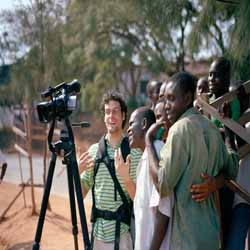This year marks the 14th anniversary of the 1994
genocide in Rwanda. In the United States, events have been organized to
highlight the progress made by the Rwandan society since then. Among
the presenters at a New York event on the occasion is Taylor Krauss, a
young American documentary filmmaker who for the past two years has
been recording the testimony of Rwandan genocide survivors.
 |
| Taylor Krauss in Rwanda |
Krauss
created an organization named “Voices of Rwanda,” which seeks to
preserve the stories of the survivors as an important oral history for
education and research about genocide. “Rwandans' need to share their
stories and the value of their histories for all people,“ he says.
Krauss started out as a documentary filmmaker on a visit to Rwanda.
He was working on an entirely different project. But he realized that
people were always willing to share their stories with him.
The Voices of Rwanda will make the video archives available to
educational institutions as “an educational resource for students and
researchers,” Krauss says. Filming of the survivors’ stories is a long
process that involves translation of the testimony and transcribing it,
a task that takes lots of volunteers putting in days of work for a
single project.
Krauss reiterates the importance of letting the survivors tell their
story without interruption. There is no time limit on how long they can
speak. Some interviews take a full day of filming. “We don't set for
them a timeline,” Krauss says, adding, “Some of their stories stretch
further than the events of 1994.” Krauss says he has been able to get
young people in Rwanda to volunteer to do different tasks for the
project. “This is a grassroots initiative.” Some of the survivors have
come back to help as volunteers on the project because they understand
and appreciate its importance.
The testimony will be used in high schools across the United States
and will also be available to museums and other learning institutions
around the world. That way, many Rwandan men, women and children will
be given not only a voice in history but also an audience to hear it.
Krauss says Voices of Rwanda plans to put the operation of the project
in the hands of Rwandans and then to continue filming for at least
twenty years

